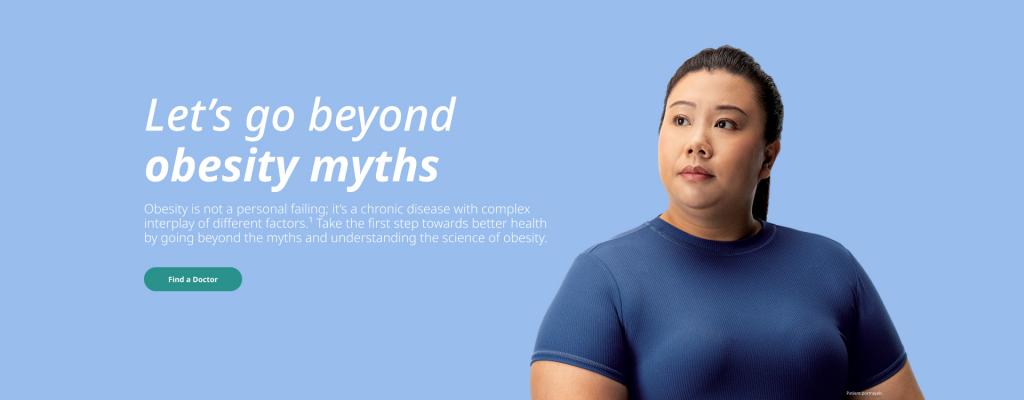- Home
- MediaOutReach
- Rethinking Obesity: Novo Nordisk's Latest Initiative Urges Singaporeans to Treat, Not Blame
Rethinking Obesity: Novo Nordisk's Latest Initiative Urges Singaporeans to Treat, Not Blame
Jumat, 27 Juni 2025 | 12:45

Novo Nordisk’s ‘Beyond the Scale’ initiative
SINGAPORE -
Media OutReach Newswire - 27 June 2025 - Imagine a chronic disease affecting more than 600,000 people 1-3
in Singapore — yet often misunderstood, overlooked, or surrounded by
stigma. This is the reality of obesity today. For many, outdated
perceptions and delays in care have created barriers to support and
treatment. Today, a new initiative is calling for a shift — to change
how we think, talk about, and respond to obesity, through a lens of
science, empathy, and early intervention.
Breaking the Myths: A Public Health Reframe
"Just eat less." "Try harder." "It's a lifestyle choice." These are more than just phrases — they reflect a deeper misunderstanding of obesity. Today, a bold new initiative, seeks to challenge those misconceptions and open the door to a more compassionate, evidence-based conversation. "Beyond the Scale" launches across Singapore with a clear and urgent call to focus on obesity as not a failure of willpower, but as a complex, chronic disease. The initiative invites the public to go beyond — beyond stigma, beyond myths, beyond labels — and recognise obesity for what science confirms it to be: a multifactorial health condition that deserves understanding, early intervention, and clinical care.
Led by global healthcare company Novo Nordisk in collaboration with local healthcare professionals and patient advocates, "Beyond the Scale" is a disease awareness initiative aimed at driving a shift in how individuals, communities, and healthcare providers approach obesity management.
"We believe it's time to shift from blame to understanding," said General Manager, Mr Vincent Siow of Novo Nordisk Singapore. "Obesity affects 1 out of 9 people in Singapore4, yet it's still too often seen as a matter of willpower. The reality is that obesity is a complex, chronic disease driven by biology, environment, and unequal access to care.1,5 It's time we treat it with the seriousness it deserves — and we are proud to lead that conversation and drive meaningful change through the "Beyond the Scale" initiative.
Why This Matters Now
The 2021–2022 National Population Health Survey reveals the highest obesity rate (15%) among adults aged 40 to 49, while 43.3% of residents aged 18 to 74 had abdominal obesity, which increases with age and peaks between 50 to 74 years.6 This is compounded by the fact that perceptions persist about obesity being a personal failing, discouraging individuals from seeking help, delaying diagnosis, and compounding the health burden on families and the healthcare system.
Obesity significantly increases the risk of cardiovascular disease (CVD), type 2 diabetes, and chronic kidney disease (CKD)7, all of which already place a growing strain on Singapore's healthcare infrastructure. The economic impact is substantial: in 2019, metabolic-risk related diseases, including obesity, diabetes, hypertension, CKD, and cardiovascular conditions, cost Singapore S$2.20 billion.8 Of this, S$642 million were healthcare expenditures8, and excess weight alone accounted for an estimated S$261 million in annual medical and absenteeism costs.9 Without decisive public health action, these obesity-related comorbidities are poised to escalate into a major societal and economic burden.
"This is not just a personal issue — it's a public health priority," said Dr Ben Ng, Arden Diabetes & Endocrine Clinic. "We know obesity changes how the body regulates appetite, energy storage, and metabolism. It's a disease, not a choice. Science supports this — and our response should reflect it."
The Science Behind the Message
Obesity is not simply about calories in and out. Research confirms it involves neuroendocrine (hormonal), genetic, and psychosocial factors, making it both preventable and treatable10 .
Studies show that in Singapore, weight stigma is often driven by the belief that obesity is a personal failing, lack of willpower, or lifestyle choice leading to delayed treatment, reduced care-seeking, and poorer health outcomes, particularly in managing chronic conditions such as cardiovascular and kidney disease.11
Beyond Labels, Toward Lasting Change
"Beyond the Scale" is more than a slogan — it is a call to treat obesity as the complex, chronic disease that it is. To move away from blame, appearance-based judgments, and oversimplified narratives, toward empathy, science, and sustained health. It is an urgent appeal to rethink, retrain, and rehumanise the way we support individuals living with obesity.
"The earlier we intervene, the better the outcomes," said Dr. Ng. "Obesity is not a character flaw. It's a disease. And it's time we responded with the same respect, science, and care we give every other chronic condition."
"Beyond the Scale" aims to:
Singaporeans can participate by:
1. Cuciureanu M, Caratașu CC, Gabrielian L, Frăsinariu OE, Checheriță LE, Trandafir LM, Stanciu GD, Szilagyi A, Pogonea I, Bordeianu G, Soroceanu RP, Andrițoiu CV, Anghel MM, Munteanu D, Cernescu IT, Tamba BI. 360-Degree Perspectives on Obesity. Medicina (Kaunas). 2023 Jun 9;59(6):1119. doi: 10.3390/medicina59061119. PMID: 37374323; PMCID: PMC10304508.
2. World Obesity. Retrieved from https://www.worldobesity.org/about/about-obesity/prevalence-of-obesity
3. World Obesity. Retrieved from https://data.worldobesity.org/country/singapore-192/
4. Lee, Y. V., & Tan, N. C. (2014). Obesity in Singapore: An update. The Singapore Family Physician, 40(2), 11–16. https://cfps.org.sg/publications/the-singapore-family-physician/article/71_pdf
5. World Health Organization. (2024). Obesity and overweight.WHO.https://www.who.int/news-room/fact-sheets/detail/obesity-and-overweight As accessed on 22nd May 2025.
6. Ministry of Health, Singapore. (2022). National Population Health Survey 2022 Report. https://isomer-user-content.by.gov.sg/3/28c3b8f9-9216-46be-8fc9-b614098666a9/nphs-2022-survey-report_final.pdf
7. Cohen JB, Cohen DL. Cardiovascular and renal effects of weight reduction in obesity and the metabolic syndrome. Curr Hypertens Rep. 2015 May;17(5):34. doi: 10.1007/s11906-015-0544-2. PMID: 25833456; PMCID: PMC4427189.
8. Tan, V., Lim, J., Akksilp, K. et al. The societal cost of modifiable risk factors in Singapore. BMC Public Health 23, 1285 (2023). https://doi.org/10.1186/s12889-023-16198-2 (2.2 Billion)
9. Junxing C, Huynh VA, Lamoureux E, Tham KW, Finkelstein EA. Economic burden of excess weight among older adults in Singapore: a cross-sectional study. BMJ Open. 2022 Sep 16;12(9):e064357. doi: 10.1136/bmjopen-2022-064357. PMID: 36113947; PMCID: PMC9486358.
10. Bray GA, Kim KK, Wilding JPH; World Obesity Federation. Obesity: a chronic relapsing progressive disease process. A position statement of the World Obesity Federation. Obes Rev. 2017 Jul;18(7):715-723. doi: 10.1111/obr.12551. Epub 2017 May 10. PMID: 28489290.
11. Goff AJ, Lee Y, Tham KW. Weight bias and stigma in healthcare professionals: a narrative review with a Singapore lens. Singapore Med J. 2023 Mar;64(3):155-162. doi: 10.4103/singaporemedj.SMJ-2022-229. PMID: 36876621; PMCID: PMC10071861.
Breaking the Myths: A Public Health Reframe
"Just eat less." "Try harder." "It's a lifestyle choice." These are more than just phrases — they reflect a deeper misunderstanding of obesity. Today, a bold new initiative, seeks to challenge those misconceptions and open the door to a more compassionate, evidence-based conversation. "Beyond the Scale" launches across Singapore with a clear and urgent call to focus on obesity as not a failure of willpower, but as a complex, chronic disease. The initiative invites the public to go beyond — beyond stigma, beyond myths, beyond labels — and recognise obesity for what science confirms it to be: a multifactorial health condition that deserves understanding, early intervention, and clinical care.
Led by global healthcare company Novo Nordisk in collaboration with local healthcare professionals and patient advocates, "Beyond the Scale" is a disease awareness initiative aimed at driving a shift in how individuals, communities, and healthcare providers approach obesity management.
"We believe it's time to shift from blame to understanding," said General Manager, Mr Vincent Siow of Novo Nordisk Singapore. "Obesity affects 1 out of 9 people in Singapore4, yet it's still too often seen as a matter of willpower. The reality is that obesity is a complex, chronic disease driven by biology, environment, and unequal access to care.1,5 It's time we treat it with the seriousness it deserves — and we are proud to lead that conversation and drive meaningful change through the "Beyond the Scale" initiative.
Why This Matters Now
The 2021–2022 National Population Health Survey reveals the highest obesity rate (15%) among adults aged 40 to 49, while 43.3% of residents aged 18 to 74 had abdominal obesity, which increases with age and peaks between 50 to 74 years.6 This is compounded by the fact that perceptions persist about obesity being a personal failing, discouraging individuals from seeking help, delaying diagnosis, and compounding the health burden on families and the healthcare system.
Obesity significantly increases the risk of cardiovascular disease (CVD), type 2 diabetes, and chronic kidney disease (CKD)7, all of which already place a growing strain on Singapore's healthcare infrastructure. The economic impact is substantial: in 2019, metabolic-risk related diseases, including obesity, diabetes, hypertension, CKD, and cardiovascular conditions, cost Singapore S$2.20 billion.8 Of this, S$642 million were healthcare expenditures8, and excess weight alone accounted for an estimated S$261 million in annual medical and absenteeism costs.9 Without decisive public health action, these obesity-related comorbidities are poised to escalate into a major societal and economic burden.
"This is not just a personal issue — it's a public health priority," said Dr Ben Ng, Arden Diabetes & Endocrine Clinic. "We know obesity changes how the body regulates appetite, energy storage, and metabolism. It's a disease, not a choice. Science supports this — and our response should reflect it."
The Science Behind the Message
Obesity is not simply about calories in and out. Research confirms it involves neuroendocrine (hormonal), genetic, and psychosocial factors, making it both preventable and treatable10 .
Studies show that in Singapore, weight stigma is often driven by the belief that obesity is a personal failing, lack of willpower, or lifestyle choice leading to delayed treatment, reduced care-seeking, and poorer health outcomes, particularly in managing chronic conditions such as cardiovascular and kidney disease.11
Beyond Labels, Toward Lasting Change
"Beyond the Scale" is more than a slogan — it is a call to treat obesity as the complex, chronic disease that it is. To move away from blame, appearance-based judgments, and oversimplified narratives, toward empathy, science, and sustained health. It is an urgent appeal to rethink, retrain, and rehumanise the way we support individuals living with obesity.
"The earlier we intervene, the better the outcomes," said Dr. Ng. "Obesity is not a character flaw. It's a disease. And it's time we responded with the same respect, science, and care we give every other chronic condition."
"Beyond the Scale" aims to:
- - Raise awareness of obesity as a chronic, multifactorial disease.
- - Reduce stigma and myths that hinder early care.
- - Encourage timely, evidence-based conversations with healthcare professionals.
- - Promote empathy and science within the medical community.
- - Support patients with tools to take charge of their health.
Singaporeans can participate by:
- - Visiting [www.truthaboutweight.sg] for factual resources, use a BMI measurement tool, and locate a nearest weight management healthcare professional.
- - Starting honest conversations with GPs, nurses, and pharmacists.
- - Sharing content to help dismantle myths and support loved ones on their health journeys.
1. Cuciureanu M, Caratașu CC, Gabrielian L, Frăsinariu OE, Checheriță LE, Trandafir LM, Stanciu GD, Szilagyi A, Pogonea I, Bordeianu G, Soroceanu RP, Andrițoiu CV, Anghel MM, Munteanu D, Cernescu IT, Tamba BI. 360-Degree Perspectives on Obesity. Medicina (Kaunas). 2023 Jun 9;59(6):1119. doi: 10.3390/medicina59061119. PMID: 37374323; PMCID: PMC10304508.
2. World Obesity. Retrieved from https://www.worldobesity.org/about/about-obesity/prevalence-of-obesity
3. World Obesity. Retrieved from https://data.worldobesity.org/country/singapore-192/
4. Lee, Y. V., & Tan, N. C. (2014). Obesity in Singapore: An update. The Singapore Family Physician, 40(2), 11–16. https://cfps.org.sg/publications/the-singapore-family-physician/article/71_pdf
5. World Health Organization. (2024). Obesity and overweight.WHO.https://www.who.int/news-room/fact-sheets/detail/obesity-and-overweight As accessed on 22nd May 2025.
6. Ministry of Health, Singapore. (2022). National Population Health Survey 2022 Report. https://isomer-user-content.by.gov.sg/3/28c3b8f9-9216-46be-8fc9-b614098666a9/nphs-2022-survey-report_final.pdf
7. Cohen JB, Cohen DL. Cardiovascular and renal effects of weight reduction in obesity and the metabolic syndrome. Curr Hypertens Rep. 2015 May;17(5):34. doi: 10.1007/s11906-015-0544-2. PMID: 25833456; PMCID: PMC4427189.
8. Tan, V., Lim, J., Akksilp, K. et al. The societal cost of modifiable risk factors in Singapore. BMC Public Health 23, 1285 (2023). https://doi.org/10.1186/s12889-023-16198-2 (2.2 Billion)
9. Junxing C, Huynh VA, Lamoureux E, Tham KW, Finkelstein EA. Economic burden of excess weight among older adults in Singapore: a cross-sectional study. BMJ Open. 2022 Sep 16;12(9):e064357. doi: 10.1136/bmjopen-2022-064357. PMID: 36113947; PMCID: PMC9486358.
10. Bray GA, Kim KK, Wilding JPH; World Obesity Federation. Obesity: a chronic relapsing progressive disease process. A position statement of the World Obesity Federation. Obes Rev. 2017 Jul;18(7):715-723. doi: 10.1111/obr.12551. Epub 2017 May 10. PMID: 28489290.
11. Goff AJ, Lee Y, Tham KW. Weight bias and stigma in healthcare professionals: a narrative review with a Singapore lens. Singapore Med J. 2023 Mar;64(3):155-162. doi: 10.4103/singaporemedj.SMJ-2022-229. PMID: 36876621; PMCID: PMC10071861.
BERITA LAINNYA

Jumat, 27 Juni 2025 | 12:47

Jumat, 27 Juni 2025 | 12:46

Jumat, 27 Juni 2025 | 12:45

Jumat, 27 Juni 2025 | 12:44

Jumat, 27 Juni 2025 | 09:22

Jumat, 27 Juni 2025 | 09:21

Jumat, 27 Juni 2025 | 09:16




























